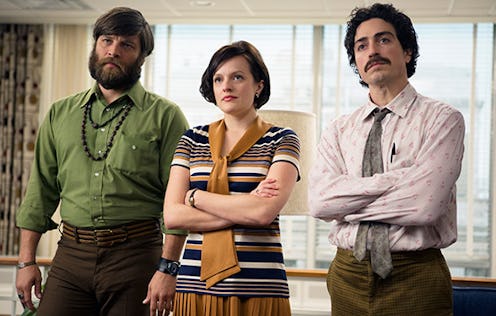Entertainment
'Mad Men's New Computer Is a Symbol of Mortality

Sunday's Mad Men episode was the bleakest of this half-season so far (can you believe there are only 3 episodes left until next year? Curse you Matthew Weiner for making us live in constant anticipation). "The Monolith" was a more symbolic and metaphoric episode than most, which is saying a lot for a show so dense with allusion and symbolism. It expounded heavily and cruelly on a classic trope in any hero or anti-hero narrative: Man versus the Machine, and boy, is Don not dealing well with his new adversary of technology.
The computer scares Don, of course, because it reminds him of his mortality. Draper has never been a man of progress: as we see his peers and colleagues embracing the rapid changes of the decade, Don remains buttoned-up, serious, trying to call back to an era that doesn't really exist anymore. He thinks he is the end-all be-all in the ad game, and the arrival of an IBM computer shows him that he's in his final hour. He is terrified by the implications, and even goes so far as to call Lloyd the devil: "I know your name," he tells him. "You've had the best campaign since the dawn of time."
It's an age-old story, but it seems even sadder when applied to Don Draper. He is a self-made man, and now, as technology is replacing him, it seems he has no purpose. He has lost his wife, his relationship with Peggy, he's ever distant from his children, and his job, which was his pride and identity, is being replaced by a box. Freddy Rumsen delivers his ultimatum: "Are you just going to kill yourself? Give them what they want?" Don decides no, for the time being, and at the end of "The Monolith" we see him typing away at his typewriter — another machine that will soon be replaced —at his meager task of delivering his tags to Peggy, once an assignment that would have been beneath him.
The question we are left with is: why do we fee sad for Don? Shouldn't it be satisfying to see a man so stuck in his ways be so unseated and unsettled by progress, by the IBM computer and by a woman in charge of him? For some reason, though, it still elicits pathos: we're all on the verge of being obsolete, aren't we.
We feel for Don, but maybe we shouldn't.
Image: AMC